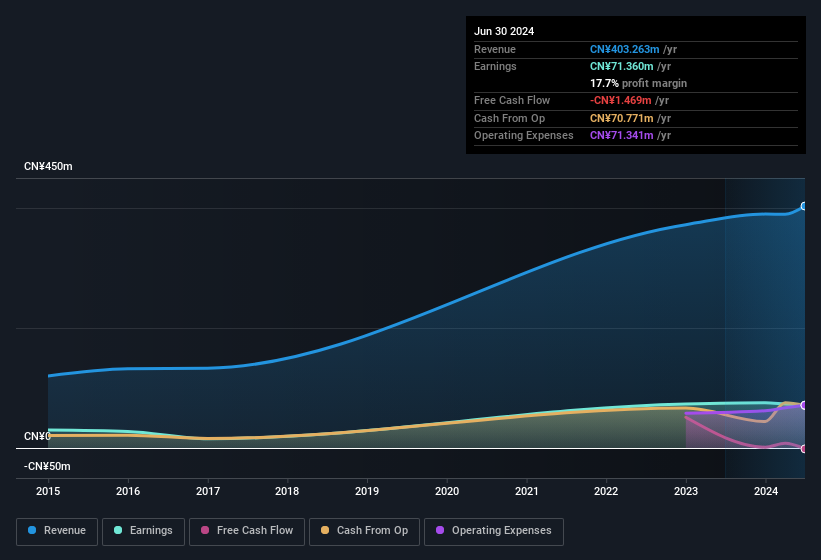Why Nanjing CompTECH Composites' (SZSE:301591) Shaky Earnings Are Just The Beginning Of Its Problems
A lackluster earnings announcement from Nanjing CompTECH Composites Corporation (SZSE:301591) last week didn't sink the stock price. Our analysis suggests that along with soft profit numbers, investors should be aware of some other underlying weaknesses in the numbers.
See our latest analysis for Nanjing CompTECH Composites

Zooming In On Nanjing CompTECH Composites' Earnings
Many investors haven't heard of the accrual ratio from cashflow, but it is actually a useful measure of how well a company's profit is backed up by free cash flow (FCF) during a given period. In plain english, this ratio subtracts FCF from net profit, and divides that number by the company's average operating assets over that period. The ratio shows us how much a company's profit exceeds its FCF.
As a result, a negative accrual ratio is a positive for the company, and a positive accrual ratio is a negative. That is not intended to imply we should worry about a positive accrual ratio, but it's worth noting where the accrual ratio is rather high. Notably, there is some academic evidence that suggests that a high accrual ratio is a bad sign for near-term profits, generally speaking.
For the year to June 2024, Nanjing CompTECH Composites had an accrual ratio of 0.21. Therefore, we know that it's free cashflow was significantly lower than its statutory profit, which is hardly a good thing. Over the last year it actually had negative free cash flow of CN¥1.5m, in contrast to the aforementioned profit of CN¥71.4m. We saw that FCF was CN¥27m a year ago though, so Nanjing CompTECH Composites has at least been able to generate positive FCF in the past.
Note: we always recommend investors check balance sheet strength. Click here to be taken to our balance sheet analysis of Nanjing CompTECH Composites.
Our Take On Nanjing CompTECH Composites' Profit Performance
Nanjing CompTECH Composites didn't convert much of its profit to free cash flow in the last year, which some investors may consider rather suboptimal. Because of this, we think that it may be that Nanjing CompTECH Composites' statutory profits are better than its underlying earnings power. Nonetheless, it's still worth noting that its earnings per share have grown at 7.6% over the last three years. Of course, we've only just scratched the surface when it comes to analysing its earnings; one could also consider margins, forecast growth, and return on investment, among other factors. So while earnings quality is important, it's equally important to consider the risks facing Nanjing CompTECH Composites at this point in time. Every company has risks, and we've spotted 3 warning signs for Nanjing CompTECH Composites (of which 1 is a bit concerning!) you should know about.
This note has only looked at a single factor that sheds light on the nature of Nanjing CompTECH Composites' profit. But there is always more to discover if you are capable of focussing your mind on minutiae. For example, many people consider a high return on equity as an indication of favorable business economics, while others like to 'follow the money' and search out stocks that insiders are buying. While it might take a little research on your behalf, you may find this free collection of companies boasting high return on equity, or this list of stocks with significant insider holdings to be useful.
Valuation is complex, but we're here to simplify it.
Discover if Nanjing CompTECH Composites might be undervalued or overvalued with our detailed analysis, featuring fair value estimates, potential risks, dividends, insider trades, and its financial condition.
Access Free AnalysisHave feedback on this article? Concerned about the content? Get in touch with us directly. Alternatively, email editorial-team (at) simplywallst.com.
This article by Simply Wall St is general in nature. We provide commentary based on historical data and analyst forecasts only using an unbiased methodology and our articles are not intended to be financial advice. It does not constitute a recommendation to buy or sell any stock, and does not take account of your objectives, or your financial situation. We aim to bring you long-term focused analysis driven by fundamental data. Note that our analysis may not factor in the latest price-sensitive company announcements or qualitative material. Simply Wall St has no position in any stocks mentioned.
About SZSE:301591
Nanjing CompTECH Composites
Engages in the research and development, and production of sealing materials and glass fiber reinforced plastic products in China.
Flawless balance sheet unattractive dividend payer.
Market Insights
Community Narratives



